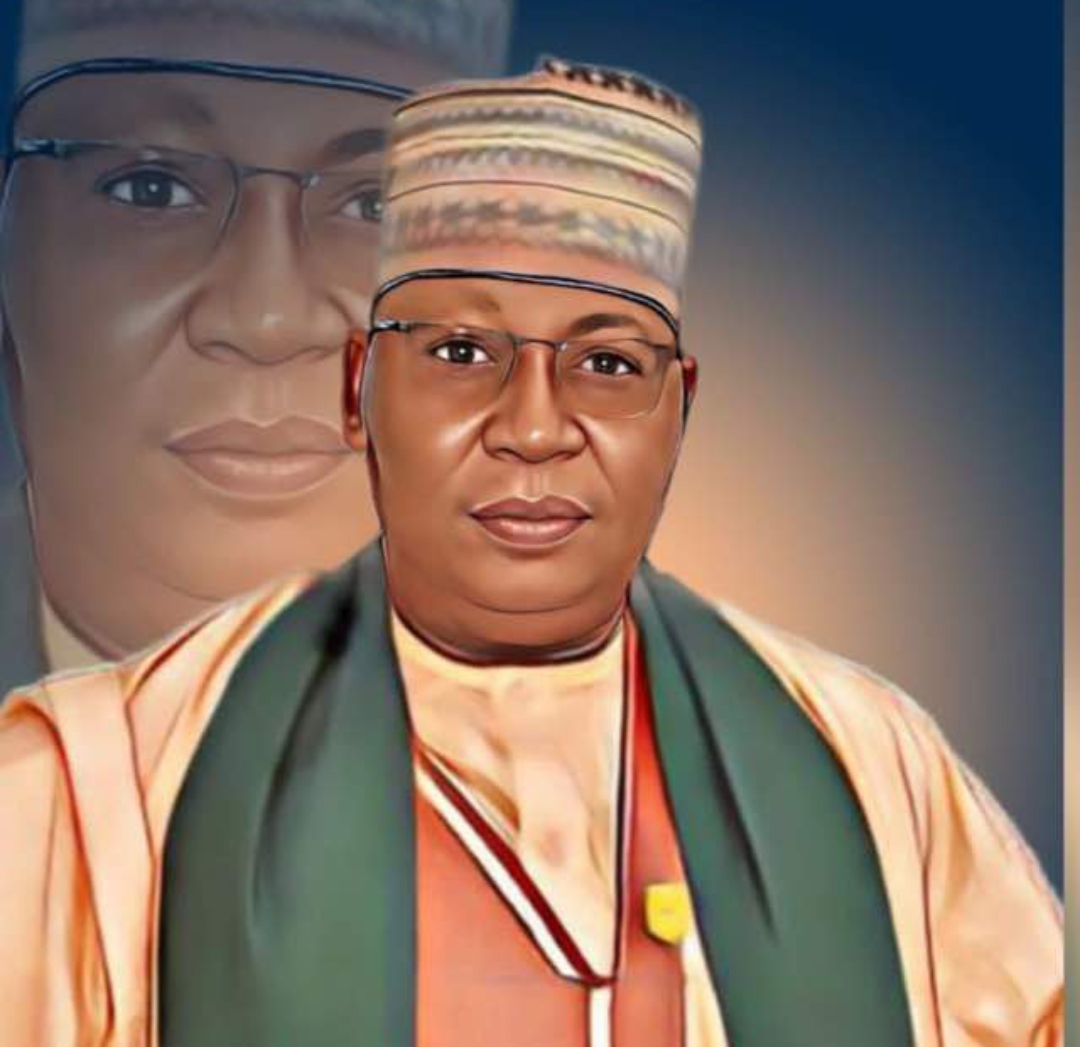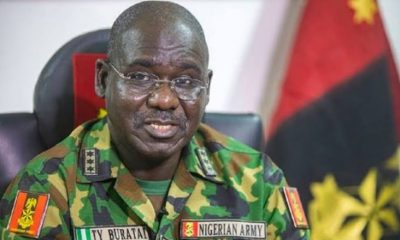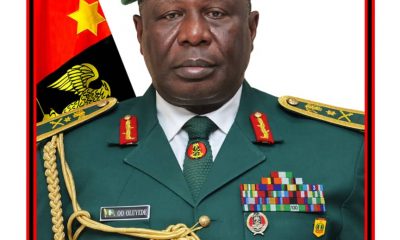society
CELEBRATING 161 YEARS OF THE NIGERIAN ARMY: A LEGACY OF BRAVERY, SERVICE, AND NATIONAL DEVELOPMENT

CELEBRATING 161 YEARS OF THE NIGERIAN ARMY: A LEGACY OF BRAVERY, SERVICE, AND NATIONAL DEVELOPMENT
By
Brigadier General Sani Kukasheka Usman (rtd) mni fnipr
As the Nigerian Army prepares to commemorate its 161st anniversary on July 6, 2024, in Jos, Plateau State, with the theme “Transforming the Nigerian Army: Imperative for Combating Contemporary Security Challenges within a Joint Environment”, it is important to spare a moment to reflect on this symbol of national power and its profound contributions to our national development, peace and security and above all the enduring legacy of one of the greatest armies in the world for over a century and a half. Therefore, this year’s Nigerian Army Day Celebration (NADCEL) 2024 is not just an attestation of the Army’s rich history, but also a recognition of its role in the nation’s security, development, and peace.
The Nigerian Army, established in 1863 with a strength of 18 men, known as the “Glover Hausas”, has grown from a modest force to a formidable institution known for its professionalism, resilience, dedication and immense contribution to national development, peace and security in our country, West Africa and beyond. Over the years, the Nigerian Army has demonstrated exceptional bravery and commitment in various national and international engagements. From peacekeeping missions in conflict-ridden regions across the world to defending the sovereignty of Nigeria during the civil war and against insurgencies and other security threats, the Nigerian Army has consistently showcased its capability and resolve as a professional army.
Beyond its military engagements in peacekeeping and peace enforcement especially in some West African states, the Nigerian Army has significantly contributed to national development. Through various civil-military cooperation initiatives, the army has been playing an important role in infrastructure development, disaster response, and community services. Projects such as the construction of roads, schools, and medical facilities in underserved areas through initiatives such as the Chief of Army Staff’s Special Projects, medical outreaches and Quick Impact Projects for host communities, highlight the army’s dedication to the defence of Nigeria’s territorial integrity and improving the quality of life for Nigerians.
In the face of internal security challenges, including insurgencies, banditry, and communal conflicts, the Nigerian Army has remained a bulwark of peace and security in Nigeria. The ongoing counterinsurgency operations against Boko Haram in the Northeast, efforts to curb kidnappings and banditry in the Northwest, and other Internal Security Operations (ISOs) in aid of civil authorities in various parts of the country pointed to the Nigerian Army’s critical role in maintaining peace and security in Nigeria.
Interestingly, the army’s counter-terrorism and counter-insurgency strategies have evolved over the years, adapting to the changing dynamics of the security challenges. This adaptability, combined with rigorous training and advanced military technologies, ensures that the Nigerian Army remains a formidable force capable of addressing contemporary security threats in the country in conjunction with other services and security agencies, hence the vision of a joint environment.
In recent years, the Nigerian Army has also made significant strides towards gender mainstreaming. The establishment of a Women’s Corps shows the service’s commitment to gender inclusivity and equality. Women in the Nigerian Army have increasingly taken on roles that were traditionally dominated by men, participating in combat, leadership, and technical positions. This inclusion not only enhances the operational effectiveness of the army but also promotes gender equality within the service.
The Nigerian Army’s modernization efforts include the establishment of an aviation corps, a giant stride in enhancing its operational capabilities. The recent acquisition of helicopters has significantly bolstered the army’s ability to conduct aerial surveillance, rapid troop deployment, and logistics support. This advancement in aviation technology will undoubtedly ensure that the Nigerian Army remains at the forefront of modern military operations, capable of addressing diverse security challenges with greater efficiency in the future.
Therefore, it is particularly gratifying that this year’s celebration is being held in Jos, Plateau State, the headquarters of the 3 Armoured Division and Operation SAFE HAVEN, known as the home of tourism in Nigeria. Jos, with its scenic landscapes, rich cultural heritage, and pleasant climate, provides a fitting backdrop for this momentous occasion. The choice of Jos not only highlights the city’s significance but also promotes its potential as a tourist destination, contributing to the state’s economic growth, and enhancing peace and security on the Plateau.
As we commemorate 161 years of the Nigerian Army, it is imperative we also honour the sacrifices of the brave officers and soldiers of the Nigerian Army who have served and continue to serve the nation with distinction. Their unwavering commitment to duty, courage in the face of adversity, discomfort and dedication to national development are the hallmarks of the Nigerian Army’s enduring legacy. Yet, despite the countless sacrifices made by these citizens in uniform, the level of understanding and appreciation from our fellow Nigerians has sometimes fallen woefully short. It is our solemn duty to rectify this, stand in solidarity with the noble protectors of our sovereign lands, and honour their commitment to preserving our cherished way of life.
The history of the Nigerian Army is a story of evolution and growth. From its origins as a small colonial force, it has transformed into a modern and highly professional institution. The journey of the Nigerian Army over the past 161 years is marked by significant milestones, including its role in the independence struggle, contributions to United Nations peacekeeping missions, and active participation in various regional and international military coalitions.
In recent years, the Nigerian Army has made strides in modernizing its equipment, adopting advanced technologies, and improving the training and welfare of its personnel. These efforts have not only enhanced the operational capabilities of the army but also boosted its morale and readiness to tackle contemporary security challenges.
The Nigerian Army’s contributions to global peace and security extend beyond the nation’s borders. Nigeria is one of the largest troop-contributing countries to United Nations peacekeeping missions, having participated in operations in Lebanon, Congo, Sierra Leone, Liberia, Sudan, South Sudan, The Gambia, Guinea and many other countries. Nigerian peacekeepers are renowned for their professionalism, bravery, and dedication to restoring peace and stability in conflict zones.
These international engagements have not only enhanced Nigeria’s reputation on the global stage but also provided valuable experience and exposure to Nigerian soldiers, further strengthening the army’s capabilities.
The Nigerian Army’s role in community outreach and humanitarian efforts cannot be overstated. In times of natural disasters, such as floods and epidemics, the army has been at the forefront of relief and rescue operations, providing critical support and assistance to affected communities. The Army’s Medical Corps has also been instrumental in delivering healthcare services to remote and underserved areas, often bridging the gap in public health infrastructure.
The army’s involvement in educational initiatives, including the establishment of schools and scholarship programmes for children of fallen soldiers, shows its commitment to the welfare of its personnel and their families. These initiatives foster a sense of community and support, ensuring that the sacrifices of soldiers and their families are recognized and honoured.
In an era of rapidly evolving security threats, the Nigerian Army has embraced technological advancements to enhance its operational effectiveness. The adoption of drones, advanced communication systems, and modern weaponry has revolutionized the army’s approach to modern warfare. These technologies provide critical intelligence, surveillance, and reconnaissance capabilities, enabling more precise and effective operations.
Furthermore, the Nigerian Army’s investment in cyber warfare capabilities and counter-terrorism strategies reflects its proactive stance in addressing new and emerging threats. Training programmes and international collaborations have been pivotal in equipping Nigerian Army officers and soldiers with the skills and knowledge necessary to navigate the complexities of modern conflict.
As we celebrate 161 years of the Nigerian Army, it is also a time to look ahead and envision the future of this esteemed institution. The Nigerian Army remains committed to its mission of defending the nation’s sovereignty, ensuring internal security, and contributing to global peace and stability.
Ongoing reforms, capacity-building initiatives, and strategic partnerships with other security agencies and international allies will continue to strengthen the army’s capabilities. The focus on enhancing the welfare and professional development of its personnel will ensure that the Nigerian Army remains a highly motivated and effective force.
Therefore, the Nigerian Army Day Celebration 2024 under the able leadership of the Chief of Army Staff, Lieutenant General TA Lagbaja, is more than a commemoration of the past; it is a celebration of the present and a commitment to the future. In Jos, Plateau State, amidst the beautiful landscapes and rich cultural heritage, we honour the Nigerian Army’s legacy of bravery, service, and national development. We celebrate the men and women who have dedicated their lives to protecting the nation and promoting peace.
Consequently, as the Nigerian Army marks this significant milestone, let us recognize and appreciate its profound contribution and impact on Nigeria’s journey towards peace, security, and development. The Nigerian Army’s legacy is a testament to the enduring spirit of patriotism, resilience and dedication that continues to inspire the nation. I beseech fellow Nigerians, to open your hearts and minds to the profound significance of our Army’s enduring legacy.
Let us not merely observe this milestone of the Nigerian Army but embrace it with the reverence and gratitude it so rightfully deserves. In doing so, we not only pay homage to the past, but we also invest in the future – a future of unity, security, and unshakable national pride. Let this be a clarion call, echoing through the very fabric of our society, imploring all Nigerians to celebrate our Army now and always, for their unwavering service is the bedrock upon which our nation’s stability and progress are built. I join millions of well-meaning Nigerians home and abroad, in celebrating our armed forces and wishing officers of the Nigerian Army a happy NADCEL 2024.
The writer, Brigadier General Sani Kukasheka Usman (rtd) mni fnipr, is a former Director of Army Public Relations and Spokesman of the Nigerian Army, public commentator and security expert.
society
Ramadan: Adron Homes Felicitates Muslims, Preaches Hope and Unity

Ramadan: Adron Homes Felicitates Muslims, Preaches Hope and Unity
Adron Homes & Properties Limited has congratulated Muslim faithful on the commencement of the holy month of Ramadan, urging Nigerians to embrace the virtues of sacrifice, discipline, and compassion that define the season.
In a statement made available to journalists, the company described Ramadan as a period of deep reflection, spiritual renewal, and strengthened devotion to faith and humanity.
According to the management, the holy month represents values that align with the organisation’s commitment to integrity, resilience, and community development.
“Ramadan is a time that teaches patience, generosity, and selflessness. As our Muslim customers and partners begin the fast, we pray that their sacrifices are accepted and that the season brings peace, joy, and renewed hope to their homes and the nation at large,” the statement read.
The firm reaffirmed its dedication to providing affordable and accessible housing solutions to Nigerians, noting that building homes goes beyond structures to creating environments where families can thrive.
Adron Homes further urged citizens to use the period to pray for national unity, economic stability, and sustainable growth.
It wished all Muslim faithful a spiritually fulfilling Ramadan.
Ramadan Mubarak.
society
Underfunding National Security: Envelope Budgeting Fails Nigeria’s Defence By George Omagbemi Sylvester

Underfunding National Security: Envelope Budgeting Fails Nigeria’s Defence
By George Omagbemi Sylvester | Published by saharaweeklyng.com
“Fiscal Rigidity in a Time of Crisis: Lawmakers Say Fixed Budget Ceilings Are Crippling Nigeria’s Fight Against Insurgency, Banditry, and Organized Crime.”
Nigeria’s legislature has issued a stark warning: the envelope budgeting system; a fiscal model that caps spending for ministries, departments, and agencies (MDAs) is inadequate to meet the country’s escalating security challenges. Lawmakers and budget analysts argue that rigid fiscal ceilings are undermining the nation’s ability to confront insurgency, banditry, kidnapping, separatist violence, oil theft and maritime insecurity.
The warning emerged during the 2026 budget defence session for the Office of the National Security Adviser (ONSA) at the National Assembly in Abuja. Senator Yahaya Abdullahi (APC‑Kebbi North), chairman of the Senate Committee on National Security and Intelligence, decried the envelope system, noting that security agencies “have been subject to the vagaries of the envelope system rather than to genuine needs and requirements.” The committee highlighted non-release or partial release of capital funds from previous budgets, which has hindered procurement, intelligence and operational capacity.
Nigeria faces a multi‑front security crisis: persistent insurgency in the North‑East, banditry and kidnappings across the North‑West and North‑Central, separatist tensions in the South‑East, and piracy affecting Niger Delta oil production. Despite declarations of a national security emergency by President Bola Tinubu, lawmakers point to a “disconnect” between rhetoric and the actual fiscal support for agencies tasked with enforcement.
Experts warn that security operations demand flexibility and rapid resource allocation. Dr. Amina Bello, a public finance specialist, said: “A static budget in a dynamic threat environment is like sending firefighters with water jugs to a forest fire. You need flexibility, not fixed ceilings, to adapt to unforeseen developments.”
The Permanent Secretary of Special Services at ONSA, Mohammed Sanusi, detailed operational consequences: irregular overhead releases, unfulfilled capital appropriations, and constrained foreign service funds. These fiscal constraints have weakened intelligence and covert units, hampering surveillance, cyber‑security, counter‑terrorism and intelligence sharing.
Delayed capital releases have stalled critical projects, including infrastructure upgrades and surveillance systems. Professor Kolawole Adeyemi, a governance expert, emphasized that “budgeting for security must allow for rapid reallocation in response to threats that move faster than political cycles. Envelope budgeting lacks this essential flexibility.”
While the National Assembly advocates fiscal discipline, lawmakers stress that security funding requires strategic responsiveness. Speaker Abbas Ibrahim underscored that security deserves “prominent and sustained attention” in the 2026 budget, balancing oversight with operational needs.
In response, the Senate committee plans to pursue reforms, including collaboration with the executive to restructure funding, explore supplementary budgets and ensure predictable and sufficient resources for security agencies. Experts warn that without reform, criminal networks will exploit these gaps, eroding public trust.
As one policy analyst summarized: “A nation declares a security emergency; but if its budget does not follow with real resources and oversight, the emergency remains rhetorical.” Nigeria’s debate over envelope budgeting is more than an accounting dispute; it is a contest over the nation’s security priorities and its commitment to safeguarding citizens.
society
Rev. Mother Kehinde Osoba (Eritosin) Celebrates as She Marks Her Birthday

Rev. Mother Kehinde Osoba (Eritosin) Celebrates as She Marks Her Birthday
Today, the world and the body of Christ rise in celebration of a rare vessel of honour, Rev. Mother Kehinde Osoba, fondly known as Eritosin, as she marks her birthday.
Born a special child with a divine mark of grace, Rev. Mother Eritosin’s journey in God’s vineyard spans several decades of steadfast service, spiritual depth, and undeniable impact. Those who know her closely describe her as a prophetess with a heart of gold — a woman whose calling is not worn as a title, but lived daily through compassion, discipline, humility, and unwavering faith.
From her early days in ministry, she has touched lives across communities, offering spiritual guidance, prophetic insight, and motherly counsel. Many testify that through her prayers and teachings, they encountered God in a deeply personal and transformative way. Near and far, her influence continues to echo — not only within church walls, but in homes, families, and destinies reshaped through her mentorship.
A mother in every sense of the word, Rev. Mother Kehinde Osoba embodies nurture and correction in equal measure. As a grandmother, she remains energetic in purpose — accommodating the wayward, embracing the rejected, and holding firmly to the belief that no soul is beyond redemption. Her life’s mission has remained consistent: to lead many to Christ and guide them into the light of a new beginning.
Deeply rooted within the C&S Unification, she stands tall as a spiritual pillar in the Cherubim and Seraphim Church globally. Her dedication to holiness, unity, and prophetic service has earned her widespread respect as a spiritual matriarch whose voice carries both authority and humility.
As she celebrates another year today, tributes continue to pour in from spiritual sons and daughters, church leaders, and admirers who see in her a living reflection of grace in action.
Prayer for Rev. Mother Kehinde Osoba (Eritosin)
May the Almighty God, who called you from birth and anointed you for His service, continually strengthen you with divine health and renewed vigour.
May your oil never run dry, and may your prophetic mantle grow heavier with greater glory.
May the lives you have nurtured rise to call you blessed.
May your latter years be greater than the former, filled with peace, honour, and the visible rewards of your labour in God’s vineyard.
May heaven continually back your prayers, and may your light shine brighter across nations.
Happy Birthday to a true Mother in Israel — Rev. Mother Kehinde Osoba (Eritosin).
More years.
More anointing.
More impact.
If you want this adapted for a newspaper page, church bulletin, Facebook post, or birthday flyer, just tell me the format and tone.
-

 celebrity radar - gossips6 months ago
celebrity radar - gossips6 months agoWhy Babangida’s Hilltop Home Became Nigeria’s Political “Mecca”
-

 society6 months ago
society6 months agoPower is a Loan, Not a Possession: The Sacred Duty of Planting People
-

 society5 months ago
society5 months agoReligion: Africa’s Oldest Weapon of Enslavement and the Forgotten Truth
-

 news6 months ago
news6 months agoTHE APPOINTMENT OF WASIU AYINDE BY THE FEDERAL GOVERNMENT AS AN AMBASSADOR SOUNDS EMBARRASSING









